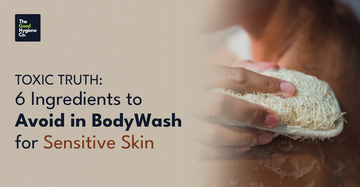If you have sensitive skin, choosing the right body wash for sensitive skin isn’t just a luxury, it’s essential for your skin’s health. Many body washes on the market are filled with ingredients that can strip your skin’s natural barrier, trigger inflammation, or cause long-term harm. What’s worse? Some of these ingredients are disguised under pleasant names like “fragrance” or “moisturizing agents.”
Sensitive skin is prone to redness, tightness, itching, and flare-ups. These are often signs of underlying inflammation or a compromised skin barrier. While some reactions are immediate, others develop slowly over time with repeated exposure. So, knowing what to avoid in your body wash for sensitive skin can save you a lot of discomfort—and possibly even your health.
Let’s decode the label and uncover six groups of toxic ingredients you should never let near your sensitive skin.
Top 6 Ingredients to Avoid in Body Wash for Sensitive Skin
1. Synthetic Moisturizers That Aren’t Skin-Friendly
Many body washes market themselves as “moisturizing,” but not all moisturizers are created equal. Synthetic oils such as mineral oil, petroleum jelly, and low-grade emollients may coat your skin, but they don’t truly nourish it. (1) Worse, they can clog pores and interfere with your skin's natural renewal process.
Compare this with plant-based oils like sunflower seed oil or jojoba oil, which mimic the skin’s natural lipids and support barrier repair. Similarly, synthetic versions of natural ingredients—like lab-created aloe vera—lack the complete spectrum of healing compounds found in real aloe gel.
If your goal is to find a body wash for sensitive skin, look for formulas with cold-pressed plant oils and whole-plant extracts. These hydrate and soothe without suffocating your skin.
2. Artificial Fragrances: The Invisible Irritants
“Fragrance” might smell good, but it’s one of the biggest offenders in skincare, especially for those with sensitive skin. Most commercial body wash for sensitive skin products still sneak in synthetic fragrances, which can contain up to hundreds of unlisted chemicals, many of which are allergens or hormone disruptors.
Fragrance compounds are among the top causes of contact dermatitis—a condition marked by rashes, redness, and inflammation. (2) Worse, the exact chemicals used in fragrance are rarely disclosed, falling under “trade secret” protection.
If you're choosing a body wash, always go fragrance-free, not “unscented” (which can still include masking fragrances). Essential oils can cause irritation if they don’t follow the specific dermal limits of usage. Instead of essential oils, look for hypoallergenic, dermatologist-tested fragrance-free formulations that rely on gentle ingredients to cleanse without irritation.
3. Preservatives That Do More Harm Than Good
Preservatives are necessary to prevent microbial growth in water-based products like body washes—but some of them are toxic, especially to sensitive skin.
Watch out for:
- Parabens (methylparaben, propylparaben): Known endocrine disruptors linked to hormone imbalances and reproductive toxicity.
- Formaldehyde-releasing agents (DMDM hydantoin, imidazolidinyl urea): These slowly release formaldehyde, a probable human carcinogen, directly onto your skin.
- Methylisothiazolinone (MI) and Methylchloroisothiazolinone (MCI): Strong allergens known to cause severe rashes and even chemical burns in sensitive individuals.
A truly gentle body wash for sensitive skin will use safer alternatives like gluconolactone, sodium benzoate, or airless packaging to avoid strong preservatives altogether.
4. Colorants: Pretty but Problematic
Many commercial body washes contain synthetic dyes to create that cheerful pink or ocean-blue hue. But these artificial colorants, especially those derived from coal tar, can contain carcinogenic byproducts.
Common culprits include:
- FD&C Red No. 40
- Blue 1 (Brilliant Blue)
- Yellow 5
While these may not harm everyone, sensitive skin can react with redness, itchiness, and irritation. Some dyes have also been linked to hyperactivity in children and are banned in other countries.
To stay safe, choose body washes that are dye-free or use natural colorants derived from clays or plant pigments. A body wash for sensitive skin doesn’t need to be flashy—it just needs to work.
5. Endocrine Disruptors Hiding in “Skin-Softening” Agents
Many body washes include synthetic softeners that mimic natural oils. These include:
- Phthalates: Often used to make fragrances last longer, phthalates are endocrine disruptors (3) that have been linked to developmental, reproductive, and neurological issues.
-
Triclosan: Once popular for its antibacterial properties, triclosan has been shown to alter hormone regulation and contribute to antibiotic resistance.
These ingredients don’t just irritate sensitive skin—they pose systemic risks when used daily. Repeated exposure through your skin (the body’s largest organ) can quietly accumulate in your tissues over time.
For a safe and truly nurturing body wash for sensitive skin, seek out natural humectants like glycerin, hyaluronic acid, or colloidal oatmeal, which soften skin without side effects.
6. Contaminated Natural Ingredients: When “Natural” Isn’t Safe
Natural doesn’t always mean safe—especially when ingredients are contaminated or processed improperly.
A prime example? Talc, which can be contaminated with asbestos. While talc is less common in body wash than in powders, some formulations may still contain it.
Similarly, low-quality plant extracts (like aloe vera or coconut derivatives) may be adulterated or preserved with harsh chemicals. Even vegetable oils can turn problematic when they’re refined using solvents or bleached, stripping them of nutrients and making them irritating to skin.
Choose brands that transparently source and process their natural ingredients. A well-formulated body wash for sensitive skin should list the complete botanical name (e.g., Helianthus annuus seed oil for sunflower oil) and avoid vague terms like “herbal base.”
Conclusion:
Sensitive skin is not just a cosmetic concern—it’s an inflammatory condition that needs careful management. And since body wash is something you use every single day, choosing the wrong formula can result in daily irritation, moisture loss, and long-term damage.
If you’re truly serious about using a body wash for sensitive skin, look beyond the marketing claims. A product that claims to be “gentle,” “dermatologist-recommended,” or “natural” can still contain toxic ingredients that quietly undo your skin’s balance.
So the next time you shop for a body wash, flip that bottle around. Watch for these six ingredient groups. Your skin—and your health—will thank you.
References:
1. Moisturizers: The Slippery Road - 2016 May - https://pmc.ncbi.nlm.nih.gov/articles/PMC4885180/#:~:text=Mineral%20oils%20are%20derived%20from,allergenicity%2C%20and%20the%20greasy%20feel.
2. The dark side of beauty: an in-depth analysis of the health hazards and toxicological impact of synthetic cosmetics and personal care products - 2024 Aug - https://pmc.ncbi.nlm.nih.gov/articles/PMC11381309/#:~:text=Allergies%20and%20skin%20irritability%20are,the%20substances%20found%20in%20cosmetics.
3. Probing Personal Care Products- Look Out for Harmful Ingredients - Aug 2022 - https://newsinhealth.nih.gov/2022/08/probing-personal-care-products#:~:text=Many%20chemicals%20of%20concern%2C%20including,brain%2C%20development%2C%20and%20reproduction.






